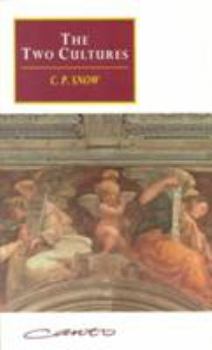The Two Cultures
Select Format
Select Condition 
Book Overview
The notion that our society, its education system and its intellectual life, is characterised by a split between two cultures - the arts or humanities on one hand, and the sciences on the other - has... This description may be from another edition of this product.
Format:Paperback
Language:English
ISBN:0521457300
ISBN13:9780521457309
Release Date:July 1993
Publisher:Cambridge University Press
Length:181 Pages
Weight:0.75 lbs.
Dimensions:0.6" x 5.3" x 8.4"
Customer Reviews
5 ratings
Definitive then, definitive now
Published by Thriftbooks.com User , 14 years ago
This was formative of my two cultures career. The updates to the 1959 lecture really only serve to emphasize how right Snow was in the first place. There is a contemporary preface by a "lit crit" that shows that the insularity of the two cultures persists. Yes, scientists should read and talk more. But the literary types should at least learn their times tables. I don't think that will do it, however. You have to be interested in things and how things work as well as in ideas. A great and fast read. The essay itself is barely 51 large-type pages.
Arguments about taking social responsibility
Published by Thriftbooks.com User , 19 years ago
In this book, Sir Charles P. Snow examines what he sees as a splitting of the intelligentsia into two subcultures, the literary and the scientific. He cites anecdotal evidence of how ignorant literary figures are concerning fundamental scientific principles and how few works of literature have been read by the typical scientist. Snow is certainly qualified to see both sides of this issue. During World War II, he was in charge of the British program of scientific recruitment and is a first-class novelist. He also notes conservative/liberal tendencies among various groups within the scientific community. He is of course correct, but the splitting is an inevitable consequence of the advance of science. As the amount of knowledge about a field of science grows, it takes more time and effort to succeed in the field. With the increase in commitment, there is less time for the individual to pursue other interests. However, that is not a wholly satisfactory excuse. Scientists are also part of the human condition and are almost always members of the advantaged class. Snow argues that they should be cognizant of the plight of the poor around the world and understand their moral obligation to try to alleviate poverty. Scientists are often and justifiably considered to possess an intellectually narrow focus. Snow is very articulate in pointing out that society is damaged when some of the best and brightest remove themselves from the search for solutions to the current problems. Even though great advances have taken place in science in the forty years since Snow put forward these observations, they are just as valid as they were then. There is a lot of common ground between the literary and scientific communities, and Snow explains why it is critical that both sides occupy as much of it as possible. All people who are concerned with the problems of modern society should read this book.
historic document, with intro essay
Published by Thriftbooks.com User , 20 years ago
The Two Cultures is probably more famous as an idea which ignited discussion than as the lecture it is. This edition of C.P. Snow's classic includes a brilliant introduction by Stefan Collini. I'm surprised that none of the other reviewers mention this portion of the edition, a substantial 64 pages, because for me it was the most interesting read. That is, only after having read The Two Cultures and a follow-up essay by Snow and pondered what may still apply today in his argument I went back and read the Collini. His introduction put Snow's work in its proper historical contexts (those of post-war Britain as well as Snow's own life) and updates us with some of the major points of the historical discourse that followed. I recommend that Collini's essay is read after Snow's, and together they make a very fine read.
Only Essential Reading
Published by Thriftbooks.com User , 23 years ago
This book defines the irrational and dangerous gulf that divides our artistic-intellectual community from our scientific. Its first publication was explosive, its effect historic. Written with the grace of a major novelist and the elegance of pure scientist, it was, and is, an original. A true original. Of how many books can one say, "It changed the way we think?" This single, short book did exactly that. It does that still. Let's call it a must read.
Snow compares scientists and literary intellectuals.
Published by Thriftbooks.com User , 27 years ago
In today's society, Liberal Arts people call scientists "nerds." Scientists call liberal arts people "fuzzies" or "bohemians." Both hold misconceptions about each other that are sometimes true and sometimes not. This classic book talks about and tries to promote cooperation between these "two cultures." Writing about his experience as a person trained in science but pursuing a writing career, Snow precisely identifies the problems of the two cultures miscommunicating with each other. It was written in the late 1950s, in Britain, so the American reader might not understand all the references. Still, Snow's work has influenced a wide range of contemporary thinkers, and has been in no small part an influence on the "writing across the curriculum" movement in American universities. Whether you are interested in the humanities or the sciences, this book clearly will show you the tensions you will face dealing with the "other culture," and the problems such stereotypes pose for mod






